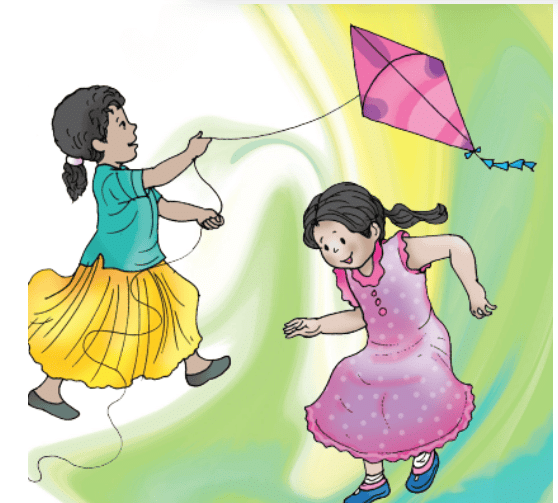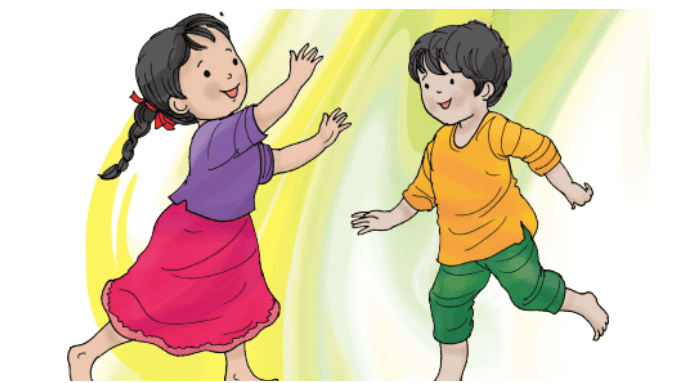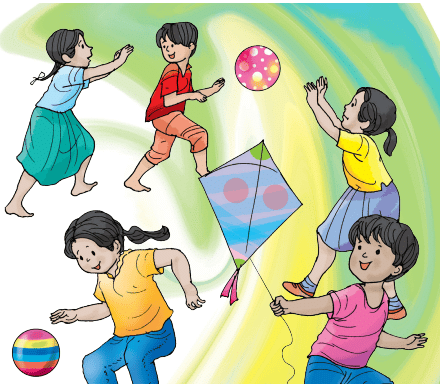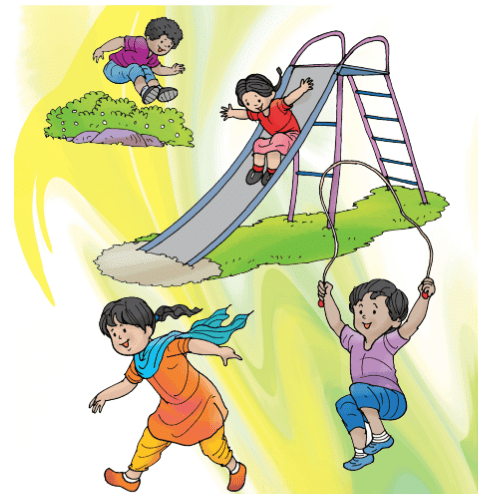Summary: Out in the Garden | English for Class 3 (Santoor) PDF Download
| Table of contents |

|
| Introduction |

|
| Explanation |

|
| Stanza 5 |

|
| Moral of the Poem |

|
| Word Meanings |

|
Introduction
Imagine a bright, sunny day with a cool breeze in the air. The garden is full of fresh green grass, coluorful flowers, and the sounds of birds chirping!
This poem takes us into the joyful world of a child who loves to play outside. Whether bouncing a ball, flying a kite, or running with friends, every moment is filled with happiness and excitement. The poem reminds us how wonderful it feels to be outdoors, enjoying simple games that bring laughter and fun.

Explanation
Stanza 1
Out in the garden,Each fine day,
With my ball,
I like to play.

In this stanza, the poet tells us about being outside in the garden. It is a beautiful day, which makes everything seem nice. The poet loves to play with a ball. This shows us that playing outside is fun and makes us happy. The words "each fine day" mean that every day when the weather is good, the poet enjoys playing. It’s a simple way to say that being outside is good for having fun.
Stanza 2
I bounce my ball,I throw my ball.
I catch my ball,
On each fine day.
Here, the poet describes what they do with the ball."I bounce my ball" means they are making the ball go up and down by hitting it on the ground. When they say "I throw my ball," it means the poet is tossing the ball into the air. Then, "I catch my ball" shows that they are able to grab it when it comes back down. This stanza tells us that the poet is very active and enjoys different ways to play with the ball. Each action—bouncing, throwing, and catching—shows us how fun and exciting it is to play.
Stanza 3
Out in the garden,
Each fine day.
With my kite,
I like to play.
In this stanza, the poet is still in the garden, and it is still a nice day. But now, instead of a ball, the poet is talking about a kite. A kite is a toy that flies in the sky when tied to a string. The poet enjoys playing with the kite just like with the ball. It shows us that there are many fun things to do outside. This stanza reminds us how exciting it is to play with different toys in the garden.
Stanza 4
I tug my kite,
I pull my kite.
I fly my kite,
On each fine day.
Now, the poet explains what they do with the kite."I tug my kite" means they are gently pulling the string to keep it in the air. "I pull my kite" is similar, showing that they are making sure the kite stays up high. Finally, "I fly my kite" means the kite is soaring in the sky. This stanza is all about the joy of flying a kite and feeling the wind. It tells us that playing with a kite is also a wonderful way to enjoy the nice weather.
Stanza 5
Out in the garden,
Each fine day.
With my friends,
I like to play.
Here, the poet is still enjoying the garden on a beautiful day. But now, they are with their friends. This is important because playing with friends makes everything more fun. The poet loves to share the experience of playing outside with others. It shows us that playing together can make us happy and create good memories. Friends make playtime even more special.
Stanza 6
We run and skip,
We jump and sway.
We slide and swing,
On each fine day.
In this last stanza, the poet describes all the fun things they do with their friends."We run and skip" means they move quickly and happily."We jump and sway" shows they are having a lot of fun and being playful."We slide and swing"talks about playing on playground equipment. This stanza is all about joy and movement. It tells us that there are so many ways to play with friends in the garden, and each activity makes them smile.
Moral of the Poem
The poem teaches us that playing outside is a great way to have fun and stay active. It reminds us how enjoyable it is to spend time in nature, whether playing alone or with friends. The poem also highlights the importance of friendship and shared experiences in making our playtime more exciting.
Word Meanings
- Bounce: To spring back after hitting a surface.
- Slide: To move smoothly along a surface.
- Throw: To propel something through the air by a forward motion of the arm and hand.
- Sway: To move gently back and forth or from side to side.
|
14 videos|76 docs|12 tests
|
FAQs on Summary: Out in the Garden - English for Class 3 (Santoor)
| 1. What is the main theme of the poem "Out in the Garden"? |  |
| 2. How many stanzas are there in the poem "Out in the Garden"? |  |
| 3. What are some examples of imagery used in the poem? |  |
| 4. What moral lessons can be learned from the poem? |  |
| 5. How does the poet express emotions about the garden? |  |





















